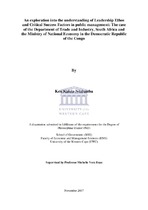| dc.contributor.advisor | Esau, Michelle Vera | |
| dc.contributor.author | Ndalamba, Ken Kalala | |
| dc.date.accessioned | 2017-12-21T12:30:36Z | |
| dc.date.available | 2017-12-21T12:30:36Z | |
| dc.date.issued | 2017 | |
| dc.identifier.uri | http://hdl.handle.net/11394/5668 | |
| dc.description | Philosophiae Doctor - PhD | en_US |
| dc.description.abstract | This dissertation assumes an explorative and descriptive approach rather than a
comparative approach. It aims at offering the concept of Leadership Ethos (LE) and its
inherent Critical Success Factors (CSFs) as a paradigm in the quest to secure organisational
efficiency and effectiveness in public management, with a particular focus on the public
policy implementation process.
It begins by presenting the background to the study, providing relevant information about
the problem and the methodology followed. It then introduces the context of the problem
of the study, sketching the context of civil service leadership before the advent of
democracy in the Republic of South Africa (RSA) and prior to independence in the
Democratic Republic of the Congo (DRC). These two countries serve as the case study
through the Department of Trade and Industry (DTI) and the National Ministry of Economy
(ECONAT) respectively. This is followed by the presentation of the theoretical framework
of the study, defined within the context of compliance-based and integrity-based
approaches to leadership, resulting in discussions on leadership theories. This leads to an
examination of public administration reforms (PARs) in the context of LE, illustrating how
PARs have resulted in a change in organisational focus and culture of the public sector.
The study examines relevant economic policies in the RSA and the DRC with a view to
illustrate the effects of LE and its subsequent CSFs on performance in public management,
in particular, with respect to the implementation of public policies. Data were then
presented and analysed with the purpose of probing the understanding of LE and its
inherent CSFs. It considers how LE enhances organisational efficiency, which in turn will
enhance social transformation, by guaranteeing the successful implementation of economic
policies. The study then presents a summary of the main findings in both case study
research areas. In its conclusion, the study proposes recommendations towards a LE that
contributes to more effective public policy implementation processes. | en_US |
| dc.language.iso | en | en_US |
| dc.publisher | University of the Western Cape | en_US |
| dc.subject | Democratic Republic of the Congo | en_US |
| dc.subject | Economic policy | en_US |
| dc.subject | Public management | en_US |
| dc.subject | Public policy | en_US |
| dc.subject | Transformation | en_US |
| dc.subject | South Africa | en_US |
| dc.subject | Trade and industry | en_US |
| dc.subject | Leadership | en_US |
| dc.title | An exploration into the understanding of Leadership Ethos
and Critical Success Factors in public management: The case
of the Department of Trade and Industry, South Africa and
the Ministry of National Economy in the Democratic Republic
of the Congo. | en_US |
| dc.rights.holder | University of the Western Cape | en_US |

